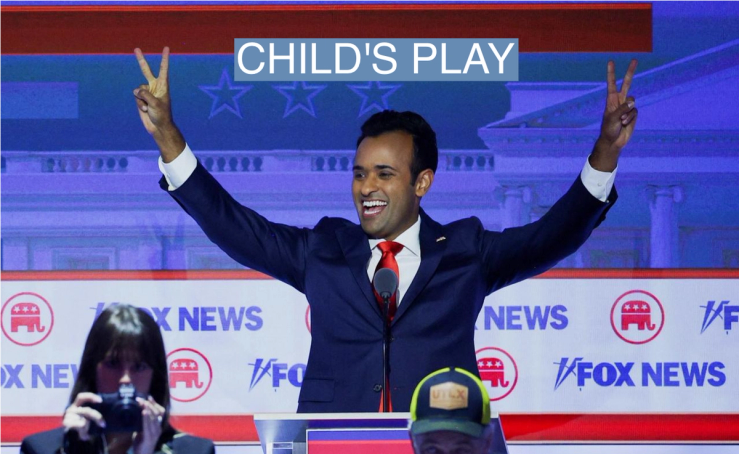The News
Vivek Ramaswamy is planning to roll out a platform aimed at encouraging more two-parent families in the U.S., his campaign told Semafor.
“He talks a lot about Lyndon B. Johnson’s failed ‘Great Society’ — in the coming weeks, he’s going to talk about how he can really dismantle that,” Tricia McLaughlin, a Ramaswamy campaign spokesperson, said. “There’s a big part of the fatherless epidemic that roots from that so he’s going to make it a major part of his economic and education policy plans.”
During the first GOP primary debate on Wednesday evening, Ramaswamy — who’s rising in primary polls — railed against a safety net that “pays single women more not to have a man in the house,” though it wasn’t immediately clear which programs he was referring to.
The coming rollout coincides with an increasing interest among some social conservatives in natalism, or policies designed to encourage more Americans to have children. It’s a cause that’s also drawn some interest in elite tech circles (Elon Musk, who praised Ramaswamy’s debate performance, is a fan)
Know More
Ramaswamy, an entrepreneur, has expressed significant interest in Hungary’s approach to families. Over the past decade, the ultraconservative government of Viktor Orban has introduced a blend of sizable tax benefits, cheap loans, and housing support measures meant to coax more Hungarians to marry and have babies. Mothers with at least four kids pay no income tax, and other benefit schemes increase in generosity for families with a larger number of children.
In early June, Ramaswamy met with the Hungarian ambassador to the US and tweeted “we have much to learn from their pro-family successes.” McLoughin, the campaign spokesperson, confirmed that Ramaswamy has remained in touch with Balázs Orbán, Viktor Orban’s political director, on family policy since interviewing him on his podcast earlier this summer.
Hungary has struggled to counter a low birthrate while drastically clamping down on immigration. While there’s been a sharp increase in marriages, the country’s family support programs haven’t yielded a surge in births so far. “It has not provided any of the kind of baby boom that was being promised five or 10 years ago,” Patrick Brown, a fellow at the Ethics and Public Policy Center, told Semafor. “The effects have been modest, at best.”
Among U.S. policy experts, so-called “marriage penalties” in taxes and aid program formulas that jeopardize benefits for lower-wage workers have also long been a hot topic. “It’s these more working-class and lower-middle class couples who stand to lose access to Medicaid, or see their [earned income tax credit] reduced if they get married and report that change in status to the government,” Brad Wilcox, the director of the National Marriage Project at the University of Virginia, told Semafor.


